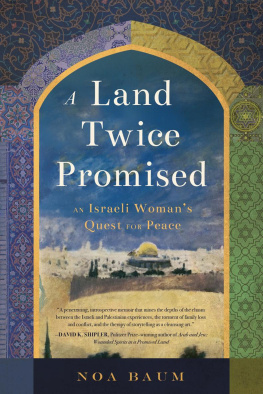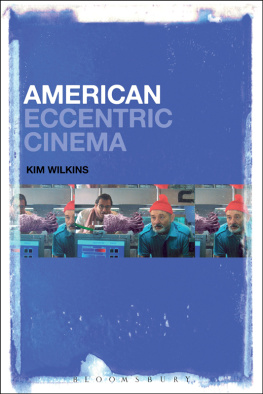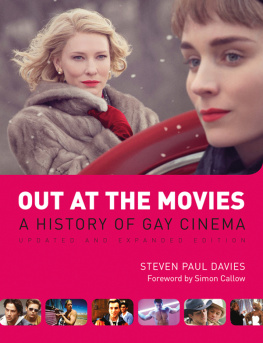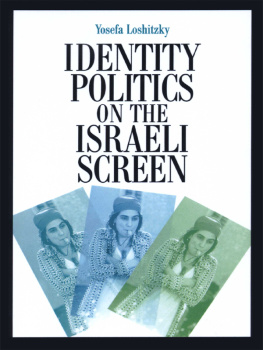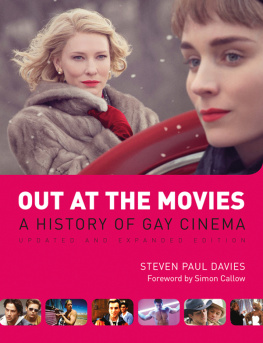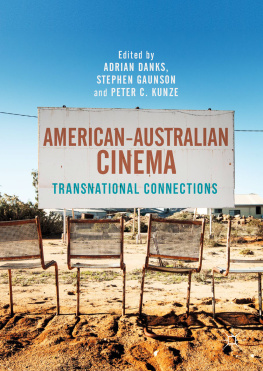The Politics of Loss and
Trauma in Contemporary
Israeli Cinema
Routledge Advances in Film Studies
1. Nation and Identity in the New German Cinema
Homeless at Home
Inga Scharf
2. Lesbianism, Cinema, Space
The Sexual Life of Apartments
Lee Wallace
3. Post-War Italian Cinema
American Intervention, Vatican Interests
Daniela Treveri Gennari
4. Latsploitation, Exploitation Cinemas, and Latin America
Edited by Victoria Rutalo and Dolores Tierney
5. Cinematic Emotion in Horror Films and Thrillers
The Aesthetic Paradox of Pleasurable Fear
Julian Hanich
6. Cinema, Memory, Modernity
The Representation of Memory from the Art Film to Transnational Cinema
Russell J.A. Kilbourn
7. Distributing Silent Film Serials
Local Practices, Changing Forms Cultural Transformation
Rudmer Canjels
8. The Politics of Loss and Trauma in Contemporary Israeli Cinema
Raz Yosef
First published 2011
by Routledge
711 Third Avenue, New York, NY 10017
Simultaneously published in the UK
by Routledge
2 Park Square, Milton Park, Abingdon, Oxon OX14 4RN
Routledge is an imprint of the Taylor & Francis Group, an informa business
2011 Taylor & Francis
The right of Raz Yosef to be identified as author of this work has been asserted by him in accordance with sections 77 and 78 of the Copyright, Designs and Patents Act 1988.
Typeset in Sabon by IBT Global.
Printed and bound in the United States of America on acid-free paper by IBT Global.
All rights reserved. No part of this book may be reprinted or reproduced or utilised in any form or by any electronic, mechanical, or other means, now known or hereafter invented, including photocopying and recording, or in any information storage or retrieval system, without permission in writing from the publishers.
Trademark Notice: Product or corporate names may be trademarks or registered trademarks, and are used only for identification and explanation without intent to infringe.
Library of Congress Cataloging-in-Publication Data
Yosef, Raz, 1967-
The politics of loss and trauma in contemporary Israeli cinema / Raz Yosef.
p. cm. (Routledge advances in film studies ; 9)
Includes bibliographical references and index.
Includes filmography.
1. War films Israel History and criticism. 2. Arab-Israeli conflictMotion pictures and the conflict. 3. Psychic trauma in motion pictures. 4. Suffering in motion pictures. 5. Nationalism in motion pictures. I. Title.
PN1993.5.I86Y88 2011
791.43'653-dc22
2010043942
ISBN13: 978-0-415-87688-9 (hbk)
ISBN13: 978-0-203-82575-4 (ebk)
For my mother, Esther Yosef
Contents
PART I
Specters of War
PART II
Trauma and Ethnicity
PART III
Sexuality and Loss
PART IV
Trauma and Ethics
Figures
Acknowledgments
This book was written with the guidance and cooperation of many people. I would like to thank Nurith Gertz for her true friendship and her thoughtful and invaluable suggestions that helped in my investigations of trauma in Israeli cinema; Hannah Naveh for her encouragement and sustained support throughout this project; Orly Lubin for her careful comments and insightful response to my work; Judd Neeman for his mentorship and for sustaining my commitment to Israeli film studies; Ella Shohat for her groundbreaking and inspiring work in cinema and cultural studies and for her personal generosity; Boaz Hagin for his intellectual companionship; and Carol Badenstein for a wonderful and warm friendship and for inviting me several times to teach in the Near Eastern Studies Department at the University of Michigan.
I would also like to express my gratitude to Rgine-Mihal Friedman, Nitzan Ben-Shaul, Raya Morag, Shmulik Duvdevani, Sandra Meiri, Yael Munk, Anton Kaes, Reuven Palgi-Hecker, Avner Faingulernt, Aeyal Gross, Amalia Ziv, Itay Harlap, and Nicholas John. I am grateful to the students I have taught in the Film and Television Department at Tel Aviv University for their questions, insights, and creativity. They have taught me much. I would also like to thank Sharona Mulay, Ronit Ben-Bassat, Yuval Ben-Atia, Alon Nachum, Alon Ziner, Sigal Yehuda, Joel Alexis, and Asaf Kolani for their continued friendship and encouragement, which will long be remembered.
Finally, I wish to thank my partner, Alex Pavlovski, for his love and support and for his presence in my life.
This research was supported by the Israel Science Foundation (grant No. 133/10).
Throughout the book, all translations from Hebrew to English are mine. Small sections of the Introduction and Chapter 7 appeared in my essay War Fantasies: Memory, Trauma and Ethics in Ari Folmans Waltz with Bashir, Journal of Modern Jewish Studies 9:3 (November 2010): 311326. Used by permission of Taylor & Francis Group. An earlier version of Chapter 1 was published as my article Traces of War: Trauma, Memory and the Archive in Joseph Cedars Beaufort, Cinema Journal 50:2 (2011): 6183. Used by permission of University of Texas Press. A shorter and differently focused version of Chapter 2 appeared as my article Spectacles of Pain: War, Masculinity and the Masochistic Fantasy in Amos Gitais Kippur, Shofar 24:1 (Fall 2005): 4966. Used by permission of Purdue University Press. A shorter version of Chapter 4 was published as my article Restaging the Primal Scene of Loss: Melancholia and Ethnicity in Israeli Cinema, Third Text 20 (2006): 487498. Used by permission of Taylor & Francis Group. A different version of Chapter 4 was first published as my essay Recycled Wounds: Trauma, Gender and Ethnicity in Keren Yedayas Or, My Treasure, Camera Obscura 72, 24:3 (2009): 4172. Used by permission of Duke University Press. A much shorter and different version of Chapter 5 appeared as my article The National Closet: Gay Israel in Yossi and Jagger, GLQ 11:2 (2005): 283300. Used by permission of Duke University Press. An earlier and highly condensed version of Chapter 6 appeared as my essay Phantasmatic Losses: National Traumas, Masculinity and Primal Scenes in Israeli CinemaWalk on Water, Framework 49:1 (Spring 2008): 93105. Used by permission of Wayne State University Press.
Introduction
The Wounds of the Nation: Exploring the New Israeli Cinema
That night, for the first time in 20 years, I had a flashback of the war in Lebanon. Not just Lebanon, West Beirut. Not Just Beirut, but the massacre at the Sabra and Shatila refugee camps.
-Ari Folman, Waltz with Bashir
REVIEWING THE PAST
Ari Folmans 2008 autobiographical film, Waltz with Bashirwhich won the 2009 Golden Globe Award and was nominated for an Academy Award for Best Foreign Language Filmdescribes the journey taken by the filmmaker, who is also the films main protagonist, in pursuit of his lost memories from the First Lebanon War. Folman goes back 26 years to his forgotten traumatic memories from the period of that war. The film is a hallucinatory quest into the depths of the directors consciousness as he tries to reconstruct three lost days from the war that have been entirely erased from his memory. Specifically, Folman attempts to locate his repressed traumatic memory of the massacre in the Palestinian refugee camps of Sabra and Shatila. This catastrophic event has been excluded from the Israeli national collective memory, and Folman feels a personal duty to try and remember the muted past. The film is an animated documentaryan animation based on documentary video footagecomposed of conversations that Folman conducted with friends and journalists who took part in the war, some of whom he has not seen for decades, as well as with psychologists who specialize in Post-Traumatic Stress Disorder and who try to help the filmmaker reconstruct those missing days from his distant past. Fragments of Folmans repressed past resurface during these conversations, as well as other traumatic memories of events experienced by the soldiers during the war: a commanders death, the loss of ones brothers in arms, evacuating the wounded and the dead, being abandoned on the battlefield, hiding from unseen snipers, fighting against children, and the murder of civilians.



